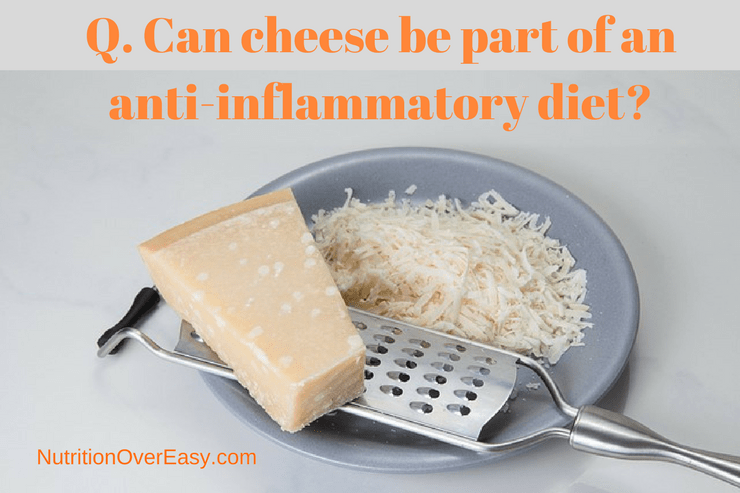
Q. Can you eat cheese on an anti-inflammatory diet?
A. Although dietary choices can affect the level of inflammation in your body, it’s too simple to say that a single food or nutrient “causes” inflammation.
Cheese contains saturated fats, which can promote inflammatory processes in the body. But other dietary fats, such as omega-3s and monounsaturated fats, have anti-inflammatory effects. So a diet that contains plenty olive oil and a bit of cheese probably isn’t pro-inflammatory. But a diet that contains lots of coconut oil (which is also high in saturated fat) plus a bit of cheese might be.
[bctt tweet=”No food or nutrient causes inflammation in a vacuum.” username=”nutritiondiva”]
And there are lots of other dietary factors that impact inflammation besides the type of fat. Refined carbohydrates are likely to promote inflammation, for example. Antioxidant rich vegetables and spices tend to be anti-inflammatory.
As I talked about in a recent episode of the Nutrition Diva podcast, it’s almost impossible to answer the question “Is ______ good/bad for me?” without considering how much you’re eating, what else you’re eating, and what you would be eating if you weren’t eating ______ instead!
Although I wouldn’t consider cheese to be an anti-inflammatory food, per se, I think there’s certainly room for moderate amount of cheese in a healthy and anti-inflammatory diet. (Thank goodness!)
If you’re interested in learning more about anti-inflammatory diets, I recently offered an online course on this topic. There’s more information on the course here, if you’d like to check that out.

Hi, Monica,
I’m a nutritionist specializing in the Mediterranean diet and a long-time follower or your writings and podcast. Thank you for your wonderful work!
Quick question: I used to use your inflammation index to help my clients compose anti-inflammatory diets; Nutritiondata.com used to feature it next to the GL score for every food listed there. The IF disappeared from Nutritiondata a while back — any reason why? Can I find it anywhere else? It’s such a helpful tool!
Thanks and best,
Conner
Hi Conner,
We reluctantly asked NutritionData.com to remove the IF Ratings from their site because the nutrient data being used to calculate them was several years out of date. As a result, many of the IF ratings displayed there were not accurate.
This was a difficult decision for us because so many people have discovered and used the IF Ratings on that site. However, the growing number of discrepancies and errors were causing a lot of confusion–and the site’s managers told us that they are not planning to update the nutrient databases anytime soon.
At present, the InflammationFactor.com website and the IF Tracker mobile app are the only authorized sources for IF Ratings. Accordingly, we are working on adding more features to the IF Tracker to make it even more useful and comprehensive.
I am so glad to see you are defending cheese! I find if I make my own cottage, cream, mozzarella, and ricotta cheeses from raw grass fed milk I have no problems whatsoever. When I buy and consume those same cheeses made with additional additives I get inflammation. At some point I will make aged cheese and make more comparisons. I already suspect yellow dye and avoid it.